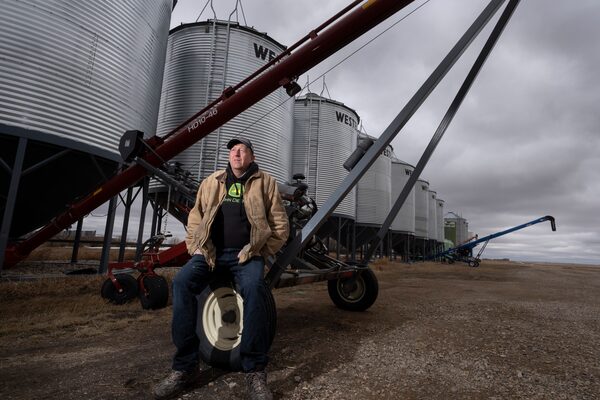
Brett Halstead has been farming for over 35 years near Nokomis, Sask.DAVID STOBBE
Farmers in the Prairies say they’re “extremely disappointed” with Ottawa’s handling of the canola crisis, singling out Prime Minister Justin Trudeau for not moving quickly enough to prevent what they say is quickly turning into “the biggest disaster" in living memory on their farms.
Earlier this week, after China expanded its ban on Canadian canola-seed imports amid escalating tensions between the countries, Mr. Trudeau told reporters he is taking the issue very seriously, and official groups representing the canola industry applauded his response. But individual farmers in Alberta and Saskatchewan who rely heavily on the crop for their livelihoods – many of whom already held suspicions about the government’s attitudes toward agriculture and the region – say they’ve lost patience.
“One thing I’m hearing more of is extreme disappointment with our government,” said Brett Halstead, a farmer in Nokomis, Sask.
“It doesn’t look or feel like they’re taking it seriously … It feels like, ‘it’s only the west, it doesn’t matter.'”
It’s an attitude echoed across the Prairies, where canola represents the number one cash crop for many farmers. It’s not unusual for some farmers to dedicate more than half of their acreage to canola. And until earlier this month, about 40 per cent of it was sold to China.
In the three weeks since China first blocked Canadian canola imports, claiming concerns about pests found in samples – and following the arrest of Huawei chief financial officer Meng Wanzhou – prices have dropped by 10 per cent.
“For a lot of farmers, 10 per cent can be your profit,” Mr. Halstead said.
Opinion: Canada must develop a backbone in its dealings with China
Canola prices tumble, Canadian farmers scramble to find new buyers amid Chinese trade tensions
On Wednesday, a spokesperson for the Prime Minister’s Office responded to questions about farmer frustrations by referring to Mr. Trudeau’s comments earlier this week. “We understand how much of a concern this is to farmers right across western Canada and the entire industry and we are going to continue to work with them and indeed with China to try and resolve this situation,” Mr. Trudeau told reporters Tuesday. He also touted the “strong leadership” of his ministers.
“We understand the concern from canola farmers, producers and industry," Agriculture Minister Marie-Claude Bibeau’s spokeswoman, Katie Hawkins, said on Wednesday. “The Prime Minister, Ministers Bibeau, Carr and Freeland are working closely with the Canadian Canola Council, Richardson International, Viterra, the governments of Alberta, Saskatchewan and Manitoba in order to resolve the issue."
The Prime Minister said earlier this week that he is considering sending a delegation to China to attempt to resolve the issue. But for farmers, this only highlighted that canola is not a priority.
“This is full-blown crisis mode,” said Stephen Vandervalk, a canola farmer in Fort Macleod, Alta. “If this does not get solved within, say, six months, this will turn into the biggest disaster in my living memory on our farms.”
Mr. Vandervalk estimated he’s already lost $50,000 based on the recent drop in canola prices. Without a solution in the next few weeks, he said, some farmers in his area are in serious danger of losing their businesses.
“This should be all they’re talking about in Ottawa right now,” he said. “Not just talking about sending a delegation – they should have been on an airplane yesterday, getting this resolved.”
Both he and Mr. Halstead wanted to see the Prime Minister himself paying a visit to China. Mr. Halstead also raised questions on whether Canada should consider trade retaliations.
For the farmers, many of whom live in conservative rural ridings, recent events have only exacerbated existing frustrations with the government. “Agriculture is just not on their radar,” Mr. Vandervalk said. He pointed to the recent appointment of Ms. Bibeau as Agriculture Minister – despite the fact that she does not have a background in agriculture – as evidence of this.
The issue comes at a particularly sensitive time. Most farmers in the Prairies would normally be planting their seeds within the next few weeks. But because of recent events, some have put their plans on hold, or changed their plans entirely.
“We’re seeding right now,” Mr. Vandervalk said. “And we don’t know what to do.”
Some farmers have taken to the internet to voice their frustrations. On any given day, the busiest place for farm talk across the region is an online forum called Agriville, where local farmers trade gossip, tips and advice, and where conversations often devolve into complaining about everything from land rental prices to weather. Privately, some farmers nickname the site “Angryville.”
But for the past few weeks, the subject they’ve been most angry about has been the canola crisis – and in particular, the government.
“Trudeau wants it swept under the rug and [to] do nothing,” one comment reads; another tried to persuade farmers to join in organizing a protest.
Mr. Halstead was until last year the president of the Canadian Canola Growers Association (CCGA). His comments now highlight the divide between the industry’s official response and the feelings of individual farmers.
In an interview, Canola Council of Canada president Jim Everson told The Globe that Ottawa has provided a “swift and substantial response.”
And the new head of the CCGA, Rick White, also defended the government. “I think the [government’s] response has been sufficient, given the circumstances and given the timing,” Mr. White said on Wednesday.
“The farmers, you know, they don’t see everything that’s going on … I think in general, the temperature, the anixiety level is high for farmers,” he said. “We’re aware of that. But I can assure you the government has heard us loud and clear, and will continue to hear us loud and clear.”
With a report from David Ebner
 Ann Hui
Ann Hui